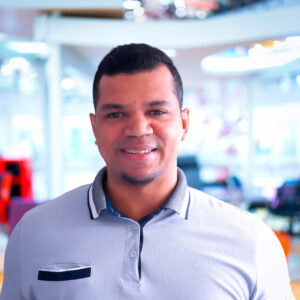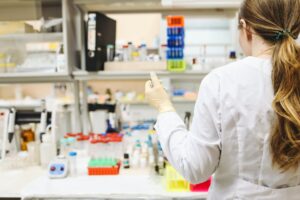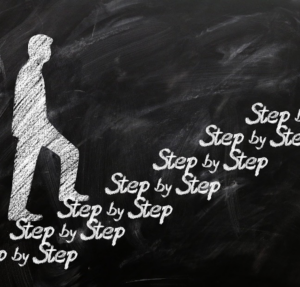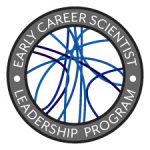
In the Decoding Life series, we talk to geneticists with diverse career paths, tracing the many directions possible after research training. This series is brought to you by the GSA Early Career Scientist Career Development Subcommittee.
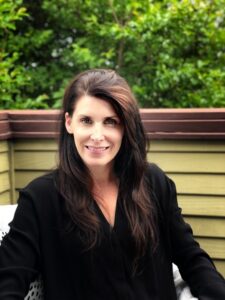
Most people are advised to follow a strict trajectory in their career path to an academic research position: go to college, pick a research field, get a PhD, obtain postdoctoral training—one right after the other. However, Dr. Lisa Zeigler Allen’s journey to her position at the J. Craig Venter Institute (JCVI) was anything but direct. At JCVI, Dr. Zeigler Allen runs a laboratory and research program studying microbial and viral ecology in the ocean. In her interview she shares her non-traditional path to this position, driven by her love for nature and understanding the world around her, and her commitment to sharing her knowledge with those around her.
How did you become interested in science?
I have several experiences that caused me to fall in love with nature. Growing up, we had a lot of animals—horses, dogs, and cows—and from an early age, I started taking care of them. I also started working at a small animal vet clinic in high school. It was really fun for me! In addition to that, my family would go deer hunting in Northern Washington state for our yearly vacation. I was not into the hunting aspect, but my Grandpa would still take walks with me, teaching me survival techniques and picking up garbage along the way. I think these early experiences led to my appreciation of the environment.
During undergrad, I was lucky to get my first job in a lab with Dr. Diter von Wettstein, a plant geneticist. He and the other individuals in the lab taught me how to do everything, and I mean everything! We isolated our own enzymes, made our own competent cells, and made all of the chemicals that went into these processes. I also worked in the greenhouse and did field trials crossing different barley cultivars. The opportunity to incorporate my love for being outside and nature into my research was incredibly important. I think that is what helped push me into the field-based research role that I am still in today.
How did your research background in plant genetics lead you to do a PhD in Oceanography?
You know, I didn’t know I wanted to do a PhD, and I was against it. If I really think back to that time and try to remember it, I felt like I was being forced into that path and told by some that I could not do the type of research I wanted to without a doctorate. In a way they were right; for many aspects of research, advanced degrees are needed. After undergrad I started the PhD program at Washington State University (WSU) to continue working with Dr. von Wettstein. One day during that time someone came and gave a talk from San Diego about marine microorganisms. I had never even thought about them before! So on a whim one night I started looking at the Scripps Institute of Oceanography in San Diego and applied to every open position. I was just about to finish the first year of my PhD at WSU when I received a call from a group at Scripps Institution of Oceanography with an introductory lab technician job.
I decided to leave the PhD program at WSU. That was a little unnerving, but Dr. von Wettstein was supportive, so I packed up my car and drove to San Diego. I worked for almost three years in the lab at Scripps. It was a very different experience, moving from plants to marine bacteria. It was a natural products lab, primarily focused on chemistry with a small microbiology division looking at the genomes of these marine microorganisms and the enzymes and pathways that are responsible for constructing secondary metabolites. I decided it was time to continue with my education and was fortunate to begin again in the PhD program at Scripps. My research began moving into the chemical nature of these organisms, and I realized this was not the path I wanted to pursue, even though it was remarkably interesting that these tiny organisms could produce a vast repertoire of compounds. While examining the early genomes of these bacteria, I found it interesting that certain bacterial genes were flanked by viral genes. This was exciting and I began thinking more about horizontal gene transfer and the role of viruses.
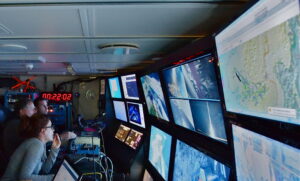
Around that time, the J. Craig Venter Institute started a second campus in San Diego and there was an early career scientist there working on marine viruses. I really wanted to work with her and learn more about viruses. So I sent her multiple emails inquiring about a possible opportunity and I ended up getting a position at JCVI. I decided to take a year off of my PhD at Scripps to move into a research position there. However, I had time before the position at JCVI would start, so I worked in industry at Invitrogen in the research and development department for a few months. I loved that job too, and it was really difficult for me to leave it when it came time to start my position at JCVI. Ultimately, the research position at JCVI allowed me to rejoin the PhD program at Scripps and become the first PhD student to bridge research between both institutes. I like to tell this story because I want people to know that it’s OK to not necessarily know what you want to do. I definitely tried out a bunch of different things and in doing so gained valuable experience along the way through learning new protocols and technologies.
What does the average day look like for you as an assistant professor at JCVI?
JCVI is a non-profit non-degree granting institute. As a result, my position is “academic-like,” but I am not beholden to other responsibilities that come with being a professor at a university, such as teaching. That gives me a lot of flexibility and opens up a lot of time for research. I do quite a bit of field work since it drives a lot of the research that we do. For my field work I am on a ship, sometimes for a day trip or sometimes up to twenty-something days. I love field work and being on the ship because it 100% immerses you into the science. You have to be very resourceful and design experiments and change things on the fly since you cannot always take another trip.
I no longer get to spend as much time in the lab performing experiments as I would like to, however I do have the ability to mentor students (from the University of California San Diego) and researchers that work in the lab. Additionally, since JCVI is a non-profit, soft-money institute, I spend a lot of time writing grants to raise the research funds and the salaries of everyone in my research group. I actually like grant writing quite a bit; I think it’s fun and exciting to design new avenues of research and ideas. On the flipside, grant writing does take away from preparing and writing manuscripts, which are also necessary to complete projects and to write proposals for more funding. It’s all about finding the balance—something I am very much still learning.
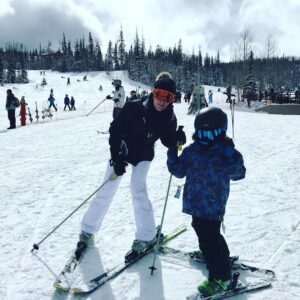
Can you tell me about your work with the League of Extraordinary Scientists and Engineers?
We call it LXS for short. What I really love about LXS is the mission, which is that science is equitable, that everyone has a right to know the science of how the world works, and that no one should be left behind. It’s important that the public is educated on what we know as scientists and it’s a fundamental right to know this information. I have been fortunate to be involved since the inception of LXS by founder Jeane Wong, and the mission has helped keep me involved and pushing for new programs. Not everyone is going to be a scientist, nor should they, but having general understandings of the biology within yourself and the biology around you are important things to know. Having this knowledge is what will drive all of our futures. I’ve also always thought it was so fun to teach kids and adults and get people excited about the world around them.
Is there a personality trait or specific skill that really makes you the right fit for your academic position and helps you succeed?
Not being afraid. I’m not saying I’m perfect at this because I do get afraid a lot, but I try to limit the amount of fear that I let creep in. There are times when I get intimidated in a room full of well-known researchers in my field, but what I try to tell myself is that they were like me once, that it’s OK to be wrong, and it’s OK to have an idea that is not picked up by the group—it doesn’t mean that it’s a bad idea. Just try not to be afraid, work hard, be passionate and curious about what you are doing, and that will drive you forward.
About the author:
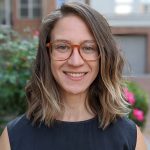
Nicole Torosin is a Postdoc Researcher at Rutgers University and a member of the Career Development Subcommittee.
Learn more about the Early Career Leadership Program.


